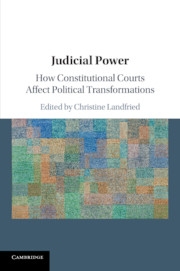Book contents
- Judicial Power
- Judicial Power
- Copyright page
- Contents
- Contributors
- Acknowledgments
- Introduction
- Part I Democratic Legitimacy of Judicial Power
- Part II Democratic Effectiveness of Judicial Power
- Part III Legitimacy, Effectiveness, and Judicial Methods of Decision-Making
- 10 Transnational Judicial Interactions and the Diplomatization of Judicial Decision-Making
- 11 Judging Methods of Mediating Conflicts
- 12 On the Representativeness of Constitutional Courts
- 13 After the Heroes Have Left the Scene
- Part IV Judicial Power in Processes of Transformation
- Index
11 - Judging Methods of Mediating Conflicts
Recognizing and Accommodating Differences in Pluralist Legal Regimes
from Part III - Legitimacy, Effectiveness, and Judicial Methods of Decision-Making
Published online by Cambridge University Press: 27 January 2019
- Judicial Power
- Judicial Power
- Copyright page
- Contents
- Contributors
- Acknowledgments
- Introduction
- Part I Democratic Legitimacy of Judicial Power
- Part II Democratic Effectiveness of Judicial Power
- Part III Legitimacy, Effectiveness, and Judicial Methods of Decision-Making
- 10 Transnational Judicial Interactions and the Diplomatization of Judicial Decision-Making
- 11 Judging Methods of Mediating Conflicts
- 12 On the Representativeness of Constitutional Courts
- 13 After the Heroes Have Left the Scene
- Part IV Judicial Power in Processes of Transformation
- Index
Summary
- Type
- Chapter
- Information
- Judicial PowerHow Constitutional Courts Affect Political Transformations, pp. 250 - 280Publisher: Cambridge University PressPrint publication year: 2019
- 7
- Cited by

